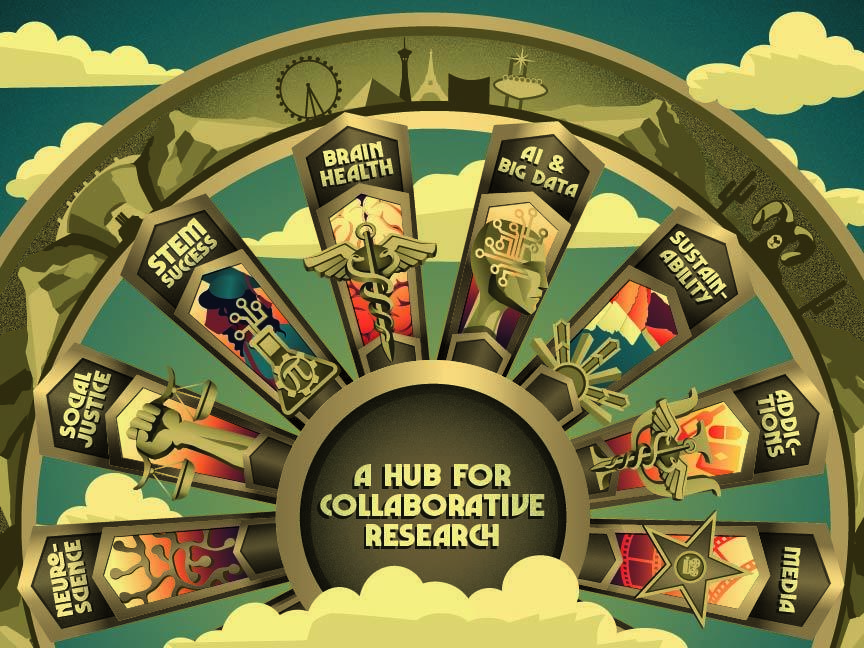
UNLV Research and Interdisciplinarity
Research at UNLV strives to develop solutions and pathways that allow us to adapt and thrive in a complex, dynamic world. UNLV is committed to becoming a leader in interdisciplinary research grounded in the recognition that the most compelling challenges are about quality of life and what it means to be human. The approach demands new ways of working together between the STEM fields, arts and humanities.
Sustainability in Arid Lands
Ensuring sustainability in arid lands requires research in STEM fields and social sciences to interact with each other to inform policy decisions. Similarly, public policy requirements drive innovation that impacts the quality of life. A goal of this area is developing solutions and approaches for sustainability through research spanning this multidisciplinary area in a way that mutually informs and shapes each individual disciplinary approach. Social and scientific problems associated with this topic range from developing innovative solutions for water reclamation and resource management to understanding and addressing social consequences of the heat-islands in cities including juvenile and adult homelessness. Faculty will collaborate on translational research, strategic planning, and communication approaches to facilitate urban sustainability and community resilience to address sustainability in arid lands.
Liaison: Eakalak Khan
Racial Equity and Social Justice
The complex interplay between race, ethnicity, and justice and its social implications provide the motivation for this broad topical research area. Objectives include but are not limited to teaching expertise of the history of or community-embedded engagement with U.S.-based Black, Latinx, Indigenous, and/or Southeast Asian youth and families. The research initiatives for this group are designed to develop policy recommendations and potential solutions to a wide range of social issues including creating and reporting on social equity for underprivileged and disadvantaged populations, addressing challenges facing foster youth and homeless individuals, facilitating workforce development to create successful life pathways for disadvantaged individuals, developing effective reentry and diversionary program to reduce incarceration rates, and providing trauma-informed care to vulnerable populations.
Liaison: Steven Nelson
Aging and Health Disparities
Optimizing the health of an aging population characterized by vast differences in socioeconomic conditions and access to cutting-edge health care is a leading challenge of our time. Brain Health takes the form of interdisciplinary research in neuroscience, aging, and health disparities to advance the science, education, and practice to benefit the health, care, and treatment of people with brain disorders across their lifespan. The research approaches within Brain Health include the development of teams that specialize in several areas ranging from basic and clinical research in neurodegenerative disease, neuropsychology, and the study of clinical trial design and outcomes to address critical needs that exist in urban and rural environments where health disparities exist.
Liaison: Jason Flatt
Addictions
Overview - Research in this complex area strives to inform and advance addiction prevention and treatment practices through constructive engagement between psychology researchers and practitioners who directly serve the Las Vegas and Southern Nevada communities. The ambition includes yielding research and practice outcomes that will benefit not only citizens of this region, but of the nation. Preventative studies are focused on the relationship between developmental theories and successful prevention program strategies that have been established. Focused treatment of addictions includes specialization in substance use, gambling, and other addictive behavior disorders for all populations. This area builds on established UNLV strengths in serving the Las Vegas community and in foundational research.
Co-Liaisons: Nicole Short & Timothy Grigsby
AI and Big Data
Overview - With the advances in computing, a huge amount of data is generated every day from all aspects of life that is generated from sources ranging from wearable sensors to medical and satellite images. These data would remain of limited use without the development of methods to move and process the data. Ubiquitous data approaches are designed to move and process the data centrally as well as distribute computing locally, thereby achieving autonomy on the device level. To achieve these goals, contributions from multiple disciplines are necessary to ensure the successful translation and use of the data at all levels.
Co-Liaisons: Mingon Kang & Shaikh Arifuzzaman
Creative Media, Entertainment, and Cultural Industries
This innovative iRDA at UNLV, an R1 research university at the heart of the entertainment capital of the world, leverages our institution and region's expertise to facilitate bold interdisciplinary approaches to the arts, science, and business of entertainment and media. This multidisciplinary team will combine the study of these two industries including business practices, cultural impacts and creative communities. The initiative will advance Las Vegas' role as a global leader in creative technologies and media production, building a strong foundation for cultivating knowledge and driving change in the dynamic creative and cultural industries.
Liaison: Marla Royne Stafford
Neuroscience
Overview - Neuroscience is a diverse field that collectivity investigates the organization, development, and function of the nervous system. It is one of the fastest growing fields of science with research ranging from mechanisms responsible for basic neuronal function to investigations of behavior, cognition, and neurological/psychiatric disorders. Development of research teams with broad disciplinary contributions are required when investigating complex neurological processes that influence behavior and cognition.
Liaison: Kelly Tseng
STEM Success iRDA
The overarching goal of the STEM Success iRDA is to ignite collaboration across disciplines and build strong, innovative teams dedicated to advancing STEM education. Together, we aim to pursue transformative infrastructure and grant opportunities that align with UNLV’s mission—expanding access, promoting student success, and enriching the student experience.
Co-Liaisons: Jacimaria Batista, Erica Marti, Eduardo Robleto, Vanessa Vongkullksn & Carrie Tyler